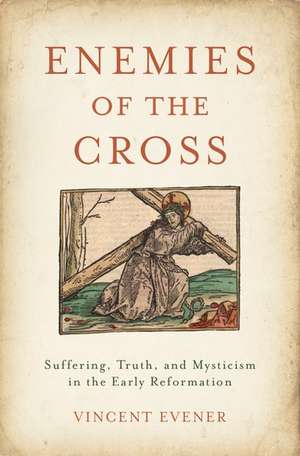Enemies of the Cross: Suffering, Truth, and Mysticism in the Early Reformation
Autor Vincent Eveneren Limba Engleză Hardback – mar 2021
Preț: 617.12 lei
Preț vechi: 708.37 lei
-13% Nou
Puncte Express: 926
Preț estimativ în valută:
118.09€ • 128.67$ • 99.50£
118.09€ • 128.67$ • 99.50£
Carte disponibilă
Livrare economică 24-29 martie
Preluare comenzi: 021 569.72.76
Specificații
ISBN-13: 9780190073183
ISBN-10: 0190073187
Pagini: 432
Dimensiuni: 239 x 165 x 36 mm
Greutate: 0.75 kg
Editura: Oxford University Press
Colecția OUP USA
Locul publicării:New York, United States
ISBN-10: 0190073187
Pagini: 432
Dimensiuni: 239 x 165 x 36 mm
Greutate: 0.75 kg
Editura: Oxford University Press
Colecția OUP USA
Locul publicării:New York, United States
Recenzii
A notable strength of this book is Evener's detailed examination of each man's intellectual development as witnessed by his successive recorded expressions, of whatever genre.
This book offers much to the reader in its illumination of the implications of mystical themes in early Protestant theologies, its extensive analysis of the sources, and reframing of the early years of reform in Wittenberg... Without doubt it is a book that makes significant original contributions concerning the influence of mysticism upon early Protestant reform movements. It is a book well worth the read.
Vincent Evener's thorough study abandons simple distinctions between mysticism and Protestantism or between mainstream and liberal reformers. He shows the common ground among such varied theologians as Luther, Karlstadt, and Müntzer as well as how their different approaches to piety led to distinct approaches to politics. Anyone who wants to understand how conflicts among the reformers emerged should read this excellent book.
Enemies of the Cross provides a masterful analysis of how early Protestant reformers viewed suffering as both a source and sign of theological truth, even though they disagreed sharply about the content of this truth. Evener demonstrates convincingly that one simply cannot understand the early development of Protestantism without taking stock of suffering and the central role it played in Reformation epistemology, theology, and spirituality. An impressive achievement.
The last half-century has seen a reassessment of the idea that Protestant reformers and medieval mysticism were irrevocably at odds, with scholars drawing attention to the ways that Protestant reformers were influenced by and indebted to late medieval mystical traditions...Evener's book also offers a contribution to the growing scholarly interest in suffering in Reformation-era Europe.
Required reading for anyone interested in the origins of the Reformation.
Evener has produced an extremely helpful study on the intellectual history of the early Reformation, especially for a readership without any knowledge of German. It is to be hoped that his book will be included in the reading lists of scholars writing on related events whose quincentenaries are looming.
Evener has produced an innovative and thought-provoking work which adds to our understanding of the role of suffering, the inheritance of late--medieval spiritual texts, and the competing discernments of true and false religion in the earliest period of the Reformation. The work is written in an accessible style and will be useful to both students and scholars.
This book offers much to the reader in its illumination of the implications of mystical themes in early Protestant theologies, its extensive analysis of the sources, and reframing of the early years of reform in Wittenberg... Without doubt it is a book that makes significant original contributions concerning the influence of mysticism upon early Protestant reform movements. It is a book well worth the read.
Vincent Evener's thorough study abandons simple distinctions between mysticism and Protestantism or between mainstream and liberal reformers. He shows the common ground among such varied theologians as Luther, Karlstadt, and Müntzer as well as how their different approaches to piety led to distinct approaches to politics. Anyone who wants to understand how conflicts among the reformers emerged should read this excellent book.
Enemies of the Cross provides a masterful analysis of how early Protestant reformers viewed suffering as both a source and sign of theological truth, even though they disagreed sharply about the content of this truth. Evener demonstrates convincingly that one simply cannot understand the early development of Protestantism without taking stock of suffering and the central role it played in Reformation epistemology, theology, and spirituality. An impressive achievement.
The last half-century has seen a reassessment of the idea that Protestant reformers and medieval mysticism were irrevocably at odds, with scholars drawing attention to the ways that Protestant reformers were influenced by and indebted to late medieval mystical traditions...Evener's book also offers a contribution to the growing scholarly interest in suffering in Reformation-era Europe.
Required reading for anyone interested in the origins of the Reformation.
Evener has produced an extremely helpful study on the intellectual history of the early Reformation, especially for a readership without any knowledge of German. It is to be hoped that his book will be included in the reading lists of scholars writing on related events whose quincentenaries are looming.
Evener has produced an innovative and thought-provoking work which adds to our understanding of the role of suffering, the inheritance of late--medieval spiritual texts, and the competing discernments of true and false religion in the earliest period of the Reformation. The work is written in an accessible style and will be useful to both students and scholars.
Notă biografică
Vincent Evener is Associate Professor of Reformation and Luther Studies at United Lutheran Seminary. He is the co-editor of Protestants and Mysticism in Reformation Europe, and the author of numerous articles and book chapters on Reformation history, theology, and spirituality.
